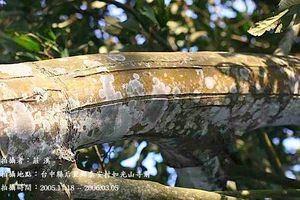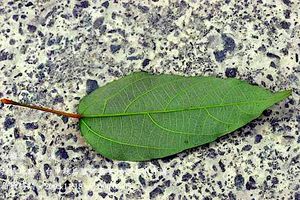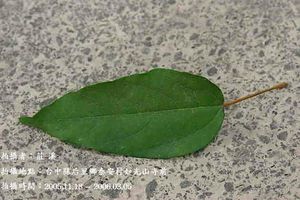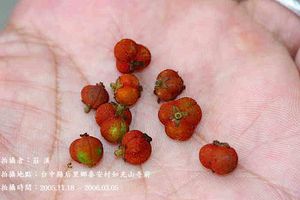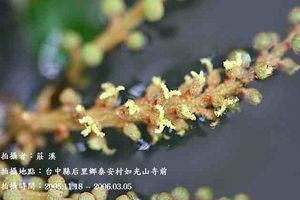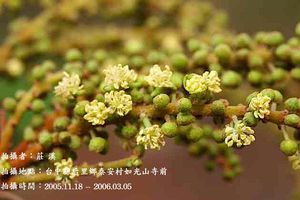粗糠柴
出自台灣有毒中草藥毒性資料庫
| 中英文學名 | 科別 | 毒性 | 症狀 |
基本資料
|
科別 | 大戟科 Euphorbiaceae |
|
屬名 | 野桐屬 Mallotus |
|
中文學名 | 粗糠柴 |
|
拉丁學名 | Mallotus philipinensis (Lam.) Muell. Arg. |
|
英文名稱 | Kamala Tree、Monkey Face Tree |
|
中文俗名 | 呂宋楸毛、山荔枝、柿糊木、六稔仔、紅果果、六檢仔、嘮哩仔、菲島桐、菲律賓野桐、Konobu'zzi(排灣) |
植物圖片
|
粗糠柴莖 |
粗糠柴葉背 |
粗糠柴葉正 | |
|
粗糠柴果實 |
粗糠柴雌花 |
粗糠柴雄花 |
粗糠柴簡介
粗糠柴,英文可稱為kamala,在印度的傳統中藥中使用了非常長的一段時間。目前根據記載根、莖、葉、果實等部分均可用於治療疾病,葉可用於治療皮膚的寄生傳染疾病,也可用於刺激性慾、止血及抗絲蟲之用[1, 2];根莖具有抗菌的能力[3];果實的莢膜可作為瀉劑及治療蛔蟲[4, 5];果實俱有抗發炎效果[6]。
外觀簡述
|
莖 | 小喬木,莖高可達約10 公尺,直徑約20~40 公分,樹幹筆直,樹皮平滑;小枝、幼葉、幼花和花序均披褐色星狀柔毛。 |
|
葉 | 單葉互生,具葉柄,柄長約 5~12 公分;葉長約 6~16 公分,寬約2~5 公分,菱形披針形或卵狀長橢圓形,全緣,掌狀脈,主葉脈三出,葉背綠白色,被星狀短毛和暗紅色腺點,葉正面近葉柄處有 2 暗紅色腺體。 |
|
花 | 花小且多數,雌雄異株或同株,總狀花序排列;花序頂生或腋生,長約 8~16 公分;雄花多數,花絲短,離生;雌花單生於花序上,花萼 2~6 裂,但大多數為 5 裂,裂片三角形,長 0.2~0.3 公分,先端銳尖;子房三是,花柱短,柱頭三枚。花期 3~5 月。 |
|
果實 | 蒴果,扁球形,三稜,長 0.5~0.8 公分,果皮表面暗紅色,披有紅色星狀毛;種仁一至三個。果期 7~9 月。 |
產地
大陸華南、印度、澳洲北部、菲律賓及台灣。台灣低海拔闊葉樹林中,常為散生狀態。
毒性研究
- 有毒成分
- Rottlerin[7-9]
- 中毒劑量
- 口服給予100 mg/kg/bw的粗糠柴種子乙醚萃取物連續三十天,影響FSH及LH分泌量及濾泡週期[10]。
- 體外試驗給予COLO 320腫瘤細胞100 μg/mL粗糠柴腺體萃取物,半數致死劑量為16.7 ± 0.5 μg/mL[11]。
- 生殖毒性
粗糠柴種子以乙醚萃取後,連續投予母鼠30天,在100 mg/kg/bw下,可發現:
- 血中促濾泡成熟激素(follicle-stimulating hormone, FSH)下降 ,
- 促黃體生成激素(luteinizing hormone, LH)下降,
- 雌激素(estradiol)、卵巢(ovary)及子宮(uterus)相對重量下降,
- 發育中濾泡(developing follicles)數量下降,閉鎖濾泡(atretic follicles)數量上升,
- 西方點墨法(western blotting)測量卵巢中的Bax蛋白含量高於控制組2.5倍,
- 排卵(ovulated eggs)及黃體(corpora lutea)數量下降,
- 發情週期(oestrus cycle)次數減少,但時間變長,
- 動情期(oestrus phase)及動情前期(proestrus phase)下降,動情後期(metestrous phase)及間情期(diestrous phase)上升,
- 母鼠不孕比例及受精卵著床數下降。
- 機轉
針對血液中FSH及LH分泌量降低的可能原因,推測為粗糠柴會影響到下丘腦及腦垂體腺體,而導致FSH及LH分泌量減少,使濾泡發育、濾泡質量、排卵量、黃體形成、動情週期都受到影響[10]。
毒性分級
參考文獻
1. Maheswari JK, Singh K, Shah S. Ethanomedicinal uses of plants by the Tharus of Kheri District, U.P. Bulletin of Medico-Ethno-Botanical Research 1980; 1: 318-337.
2. Singh RH, Singhal KC, Khan NU. Antifilarial activity of Mallotus philippensis Lam. on Setaria cervi (nematode: Filaroidea) in vitro. Indian Journal of Physiology and Pharmacology 1997; 41: 397--403.
3. Taylor RS, Edel F, Manandhar NP, Towers GH. Antimicrobial activities of southern Nepalese medicinal plants. Journal of Ethnopharmacology 1996; 50: 97-102.
4. Srivastava MC, Singh SW, Tewari JP. Anthelmintic activity of Mallotus philippinensis (kampila) powder. Indian Journal of Medical Research 1967; 55: 746-748.
5. Gupta SS, Verma P, Hishikar K. Purgative and anthelmintic effects of Mallotus philippinensis in rats against tape worm. Indian Journal of Physiology and Pharmacology 1984; 28: 63-66.
6. Daikonya A, Katsuki S, Wu J-B, Kitanaka S. Anti-allergic Agents from Natural Sources (4): Anti-allergic Activity of New Phloroglucinol Derivatives from Mallotus philippensis (Euphorbiaceae). Chemical & Pharmaceutical Bulletin 2002; 50: 1566-1569.
7. Gschwendt M, Muller HJ, Kielbassa K, Zang R, Kittstein W, Rincke G, Marks F. Rottlerin, a novel protein kinase inhibitor. Biochemical and Biophysical Research Communications 1994; 199: 93-98.
8. Gujral ML, Varma DR, Sareen KN. Oral contraceptives. Part I. Preliminary observations on the antifertility effect of some indigenous drugs. Indian Journal of Medical Research 1960; 48: 46-51.
9. Gujral ML, Varma DR, Sareen KN, Roy AK. Oral contraceptives. Part II. Antifertility effect of Mallotus philippinensis Mueller-argoviensis. Indian Journal of Medical Research 1960; 48: 52-58.
10. Thakur SC, Thakur SS, Chaube SK, Singh SP. An etheral extract of Kamala (Mallotus philippinensis (Moll.Arg) Lam.) seed induce adverse effects on reproductive parameters of female rats. Reproductive Toxicology 2005; 20: 149-156.
11. Smit HF, Woerdenbag HJ, Singh RH, Meulenbeld GJ, Labadie RP, Zwaving JH. Ayurvedic herbal drugs with possible cytostatic activity. Journal of Ethnopharmacology 1995; 47: 75-84.
| 中英文學名 | 科別 | 毒性 | 症狀 |
